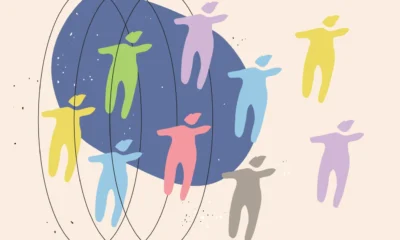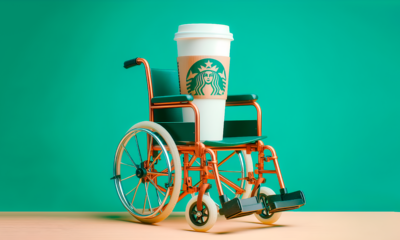Business
Devon Air Ambulance: Disability Confident Committed Employer

The Devon Air Ambulance Trust (DAAT) is a charity organization in South West England, responsible for providing emergency medical services through the provision of two helicopter-based air ambulances and two critical care cars
The Devon Air Ambulance does not limit its activities to helping those in emergency situations but also makes strides to become increasingly inclusive of people with disabilities. Recently, the company launched the first level of a scheme tagged ‘Disability Confident Committed Employer’. The scheme is similar to the Global Business and Disability Network scheme behind Inditex’s recent commitment to double their disability employment and was developed to enable every disabled person to cope and have a successful career at work without any barriers.
The scheme is committed to ensuring the recruitment processes at partaking companies are inclusive and accessible. Furthermore, partaking companies are committed to offering interviews to disabled people who met the minimum job criteria, as well as providing support to any existing employee who acquires a disability or long-term health condition, enabling them to stay at work.
As a charity organization, Devon Air Ambulance will be dedicated to offering disabled employees access to any of their work trials; paid employment (permanent or fixed term).

© Devon Air Ambulance
“We are keen to continue to do all we can to ensure our staff are able to thrive and develop in their roles. Everyone here at Devon Air Ambulance plays a vital part in the emergency medical service we provide and we aim to support all individual needs,” said Martin Bell, Director of People, Talent & Culture at Devon Air Ambulance. He also added that “the accreditation is valid for 3 years and we are looking to work towards attaining level 2 and then level 3 subsequently over the coming years.”
The Field is another new job site, built by and for people with disability that actively connects them with jobs from inclusive employers worldwide. “We understand that traditional job boards can often be barriers to gaining employment. That’s why the Field has collaborated with people with disability and has been built with accessibility at every part of the process with our accessible design and unique profile features. Our job site encourages employers to focus on what candidates can do rather than what they can’t,” published by The Field developers through their website.
Business
Starbucks and its commitment to accessibility: Creating inclusive spaces for everyone

Starbucks Coffee Company announced on February 14th that it will leverage its growing store presence to support and promote the inclusion of partners, clients, and communities it serves. To achieve this, the company has created an Inclusive Spaces Framework, which aims to enhance independence, choice, and comfort for all its consumers and employees: “Building and scaling an Inclusive Store Framework is central to our mission of connection and will lead to greater access for all” stated Katie Young, Senior Vice President of Store Operations.
One of the first Starbucks customers based on the Inclusive Spaces Framework/Starbucks
Starbucks’s Inclusive Spaces Framework has been developed by a distinctive community of customers, workers, partners, and accessibility experts, with the primary goal of providing scalable accessibility solutions for all commercial spaces. This concept began to take shape during the Covid-19 pandemic, where social distancing and the risk of contracting the disease prompted some branches to create specific time blocks. During these blocks, immunocompromised, elderly, and disabled customers could shop in a less crowded environment.
Starbucks inaugurates its first café supported by the principles of the Inclusive Spaces Framework
On February 16th, Washington, D.C. became the first city to open a Starbucks designed to provide accessible service for everyone. These innovations include a multitude of improvements, both physical and digital, that streamline the entire customer interaction process with the establishment and staff, enabling unrestricted access.
A new employee at the Washington D.C. Starbucks showcasing the facilities/Starbucks
Among these novelties, the coffee company has highlighted updates to the point-of-sale (POS) systems, which have been transformed into portable devices, making it easier for customers to make purchases and acquire products. Through an intuitive design, supported by a voice assistant and accompanied by visual confirmations, this setup caters to the needs of all customers without any distinction.
On the other hand, this revamped store features new lighting and an improved sound system, both designed to offer a more inclusive experience by avoiding glare and reverberations. Additionally, the order tracking panels in this store have been updated, allowing customers to easily and instantly know which stage of preparation their purchase is in. Furthermore, multiple communication channels have been enabled to notify the customer when their order is ready.
Finally, the store has been designed to ensure the complete independence of people with disabilities when accessing and placing their orders. This is achieved through electric doors, which can be activated by a button at different heights and angles, reducing the effort required to open them. Additionally, continuous, and obstacle-free pedestrian pathways have been created, and the counters are lower with overhangs to accommodate wheelchairs, making interaction with employees and the store more accessible.
The new staff at Starbucks in Washington D.C./Starbucks
However, for most retail centers, remodelling their premises to comply with ADA (The Americans with Disabilities Act) regulations poses a significant challenge. That’s why Starbucks will not only begin remodelling its establishments but also ensure that its framework of inclusion is accessible to everyone, just like its stores. This framework will provide a gradual program for designing inclusive spaces that enhance the retail environment, surpassing the requirements of the ADA.
By: Álvaro Lago
For latest updates Download P+us app available on Google App Store
Business
Aarti Sahgal: Creating A World In Which People With Disabilities Belong

Aarti Sahgal is a woman with a mission. She is the founder and CEO of Synergies Work, a non-profit organization that helps entrepreneurs with disabilities develop sustainable enterprises. She is also a mother to two kids, one of whom has Down syndrome. She understands directly the obstacles and opportunities that individuals with disabilities experience in society, and she is committed to creating a world in which they belong.
Sahgal’s work grew out of her personal experience parenting a disabled child and discovering a lack of inclusivity and assistance in the education and employment systems. She recognized that people with disabilities possess special skills and capabilities that are frequently overlooked or underestimated by others. She chose to leave her corporate position and devote herself to enabling people with disabilities to achieve their hobbies and goals.

Synergies work provides end-to-end business solutions, bridging the opportunity gap between the disability and business sectors. It provides training, mentoring, funding, and networking opportunities for entrepreneurs with disabilities, as well as access to a varied and supportive community. It also collaborates with businesses and groups to increase disability inclusion and diversity in the workplace and marketplace.
Since its establishment in 2016, Synergies Work has assisted over 200 entrepreneurs, the vast majority of whom are women and people of color. The company aims to empower 1 million new entrepreneurs with disabilities by 2027 by collaborating with disability organizations and businesses that prioritize creating an inclusive ecosystem.
Sahgal aims to represent and reflect the different communities in which she works, as well as to foster a workplace climate in which everyone has the opportunity to participate, grow, belong, and succeed. Sahgal’s Disability Inclusion Action Plan aims to promote inclusivity and diversity as a source of strength and value.
By- Rowland Obiosah
Business
Unveiling P+US App (Plus News): A Revolutionary Leap in Inclusive Media!

In a groundbreaking move towards a more diverse and connected media landscape, the Brand Advance Group (BA Group) has just launched its latest venture – the P+US App, affectionately known as Plus News. This app is set to redefine the way the group’s audience can consume its news, serving as a dynamic platform bringing together voices from various communities, including Black & African American, Afrobeats, Hispanic, LGBTQ+, disABILITY, GenZ, and beyond.
This initiative is just the first step in the rollout of a new generation of media channels by the BA Group and its US Division, BA Diversity Media Inc. The P+US app stands at the forefront, embodying the commitment to amplify minority-owned and operated media.

To celebrate this monumental launch, the BA Group is extending exclusive invitations to the Generation Black and Generation Hispanic TV channel launch party. The first 100 individuals to download the app and share it within their circles will secure a coveted spot at this must-attend event, scheduled to unfold in the vibrant landscapes of both NYC and London come March 2024.
BA Group’s CEO, a visionary in the media industry, expressed enthusiasm about this transformative leap. “Launching this app to house our minority-owned and operated media is the first stage of our transition from an SSP business to a media owner for a new generation. With over 7 digital channels and 3 CTV channels, all powered by our cutting-edge Cultural Intelligence technology, the P+US app provides our readers with a seamless, centralized space to engage with our diverse content. From the streets of Africa to the landscapes of India, the urban beats of the UK to the vibrant scenes in Mexico – our talented writers from across the globe are bringing a fresh perspective to every news article. It’s an exciting time in our evolution!”
As we step into this new era of media, the P+US app promises not just news but an immersive journey into the diverse narratives that shape our world. Join the revolution, download P+US, and be part of the story as it unfolds from the heart of communities worldwide!
Google App Store:
https://play.google.com/store/apps/details?id=com.newandromo.dev2408362.app3483231


















